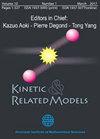Kinetic equations for processes on co-evolving networks
IF 1.5
4区 数学
Q1 MATHEMATICS
引用次数: 8
Abstract
The aim of this paper is to derive macroscopic equations for processes on large co-evolving networks, examples being opinion polarization with the emergence of filter bubbles or other social processes such as norm development. This leads to processes on graphs (or networks), where both the states of particles in nodes as well as the weights between them are updated in time. In our derivation we follow the basic paradigm of statistical mechanics: We start from paradigmatic microscopic models and derive a Liouville-type equation in a high-dimensional space including not only the node states in the network (corresponding to positions in mechanics), but also the edge weights between them. We then derive a natural (finite) marginal hierarchy and pass to an infinite limit.We will discuss the closure problem for this hierarchy and see that a simple mean-field solution can only arise if the weight distributions between nodes of equal states are concentrated. In a more interesting general case we propose a suitable closure at the level of a two-particle distribution (including the weight between them) and discuss some properties of the arising kinetic equations. Moreover, we highlight some structure-preserving properties of this closure and discuss its analysis in a minimal model. We discuss the application of our theory to some agent-based models in literature and discuss some open mathematical issues.协同演化网络过程的动力学方程
本文的目的是推导出大型共同进化网络过程的宏观方程,例如随着过滤气泡的出现而出现的意见极化或规范发展等其他社会过程。这导致了图(或网络)上的处理,其中节点中的粒子状态以及它们之间的权重都会及时更新。在我们的推导中,我们遵循统计力学的基本范式:我们从范式微观模型开始,在高维空间中推导出一个liouville型方程,不仅包括网络中的节点状态(对应于力学中的位置),还包括它们之间的边权。然后我们推导出一个自然的(有限的)边际层次,并传递到一个无限的极限。我们将讨论这个层次结构的闭包问题,并看到只有当相等状态的节点之间的权重分布集中时,才能出现一个简单的平均场解。在一个更有趣的一般情况下,我们在两粒子分布(包括它们之间的重量)的水平上提出了一个合适的闭包,并讨论了产生的动力学方程的一些性质。此外,我们强调了该闭包的一些结构保持性质,并讨论了它在最小模型中的分析。我们讨论了我们的理论在一些基于主体的模型中的应用,并讨论了一些开放的数学问题。
本文章由计算机程序翻译,如有差异,请以英文原文为准。
求助全文
约1分钟内获得全文
求助全文
来源期刊
CiteScore
2.10
自引率
10.00%
发文量
36
审稿时长
>12 weeks
期刊介绍:
KRM publishes high quality papers of original research in the areas of kinetic equations spanning from mathematical theory to numerical analysis, simulations and modelling. It includes studies on models arising from physics, engineering, finance, biology, human and social sciences, together with their related fields such as fluid models, interacting particle systems and quantum systems. A more detailed indication of its scope is given by the subject interests of the members of the Board of Editors. Invited expository articles are also published from time to time.

 求助内容:
求助内容: 应助结果提醒方式:
应助结果提醒方式:


